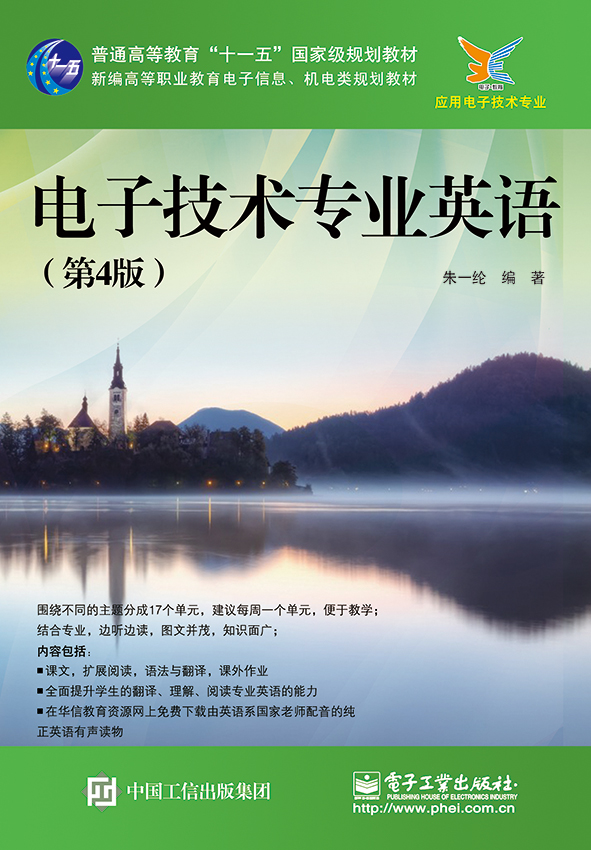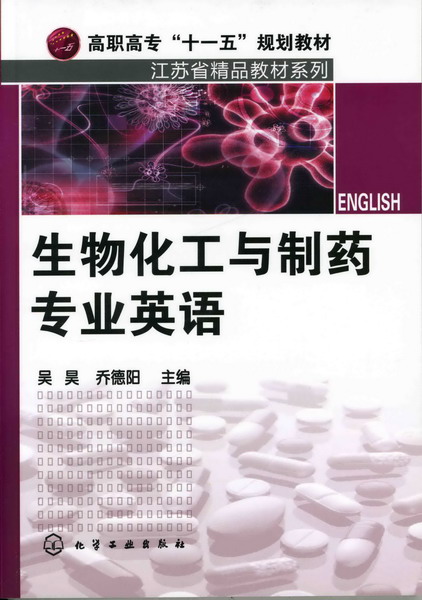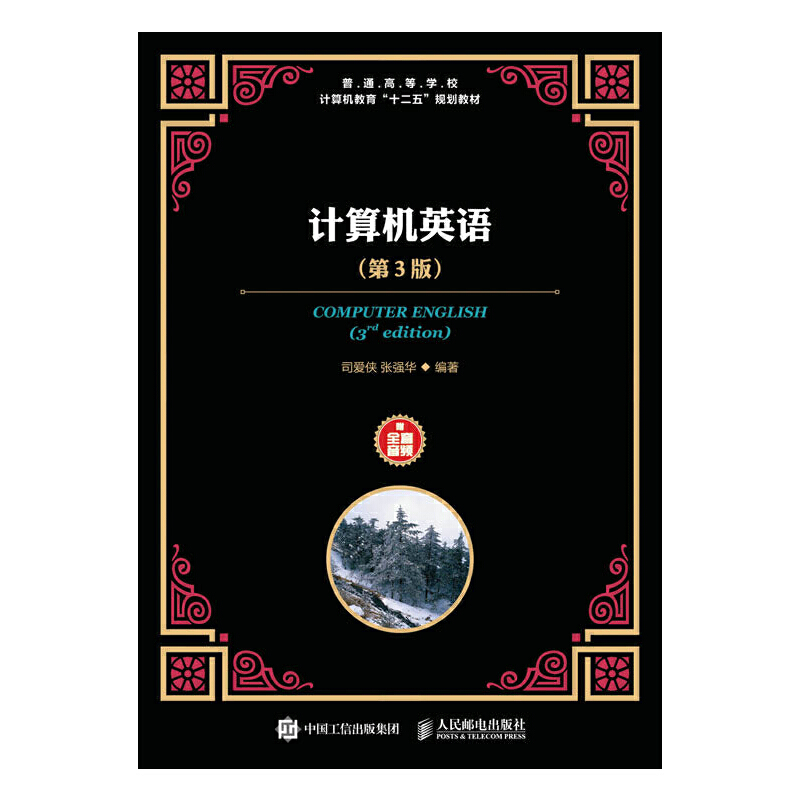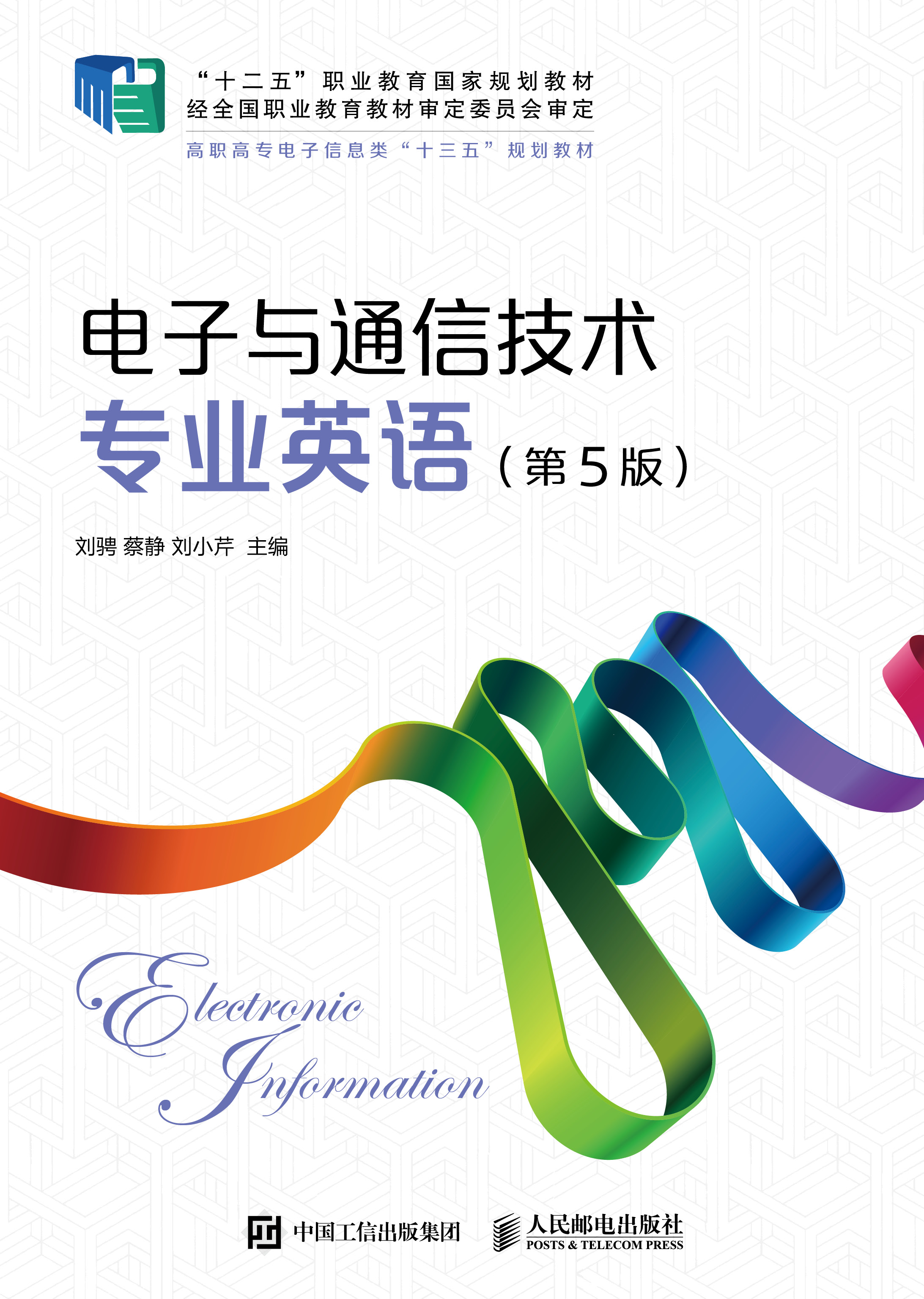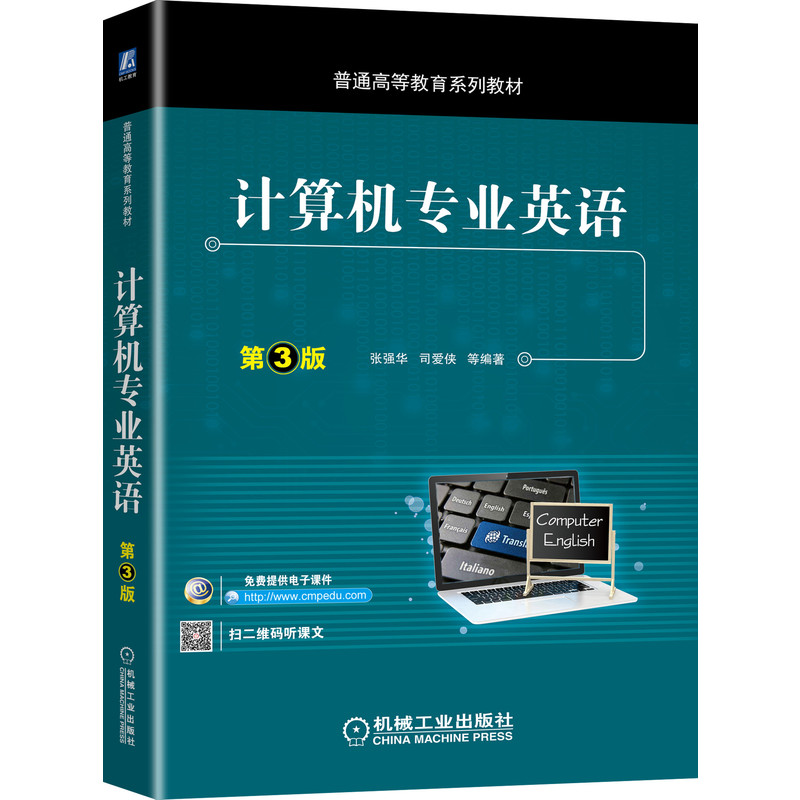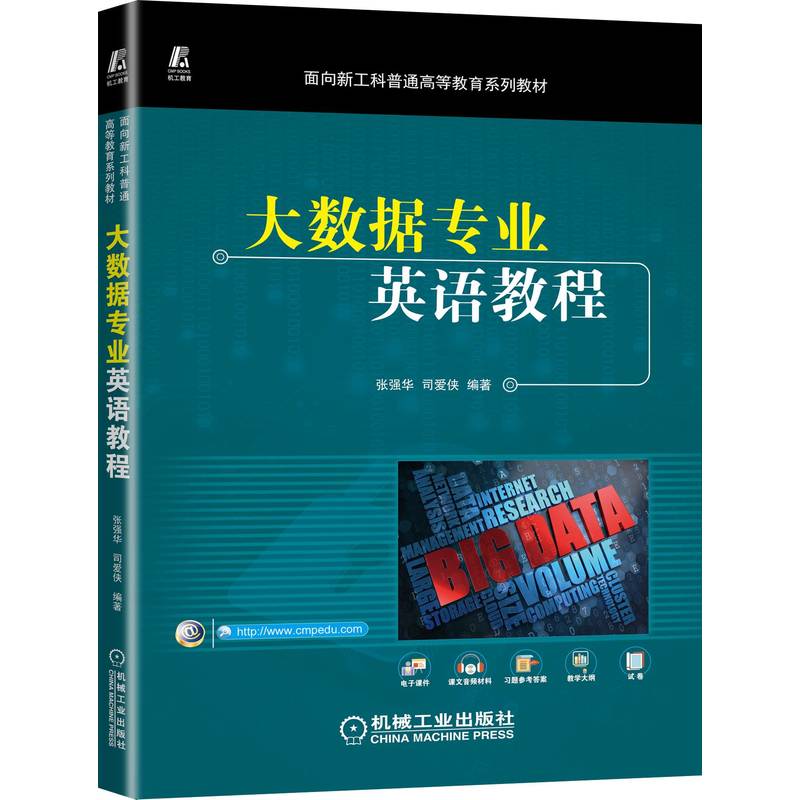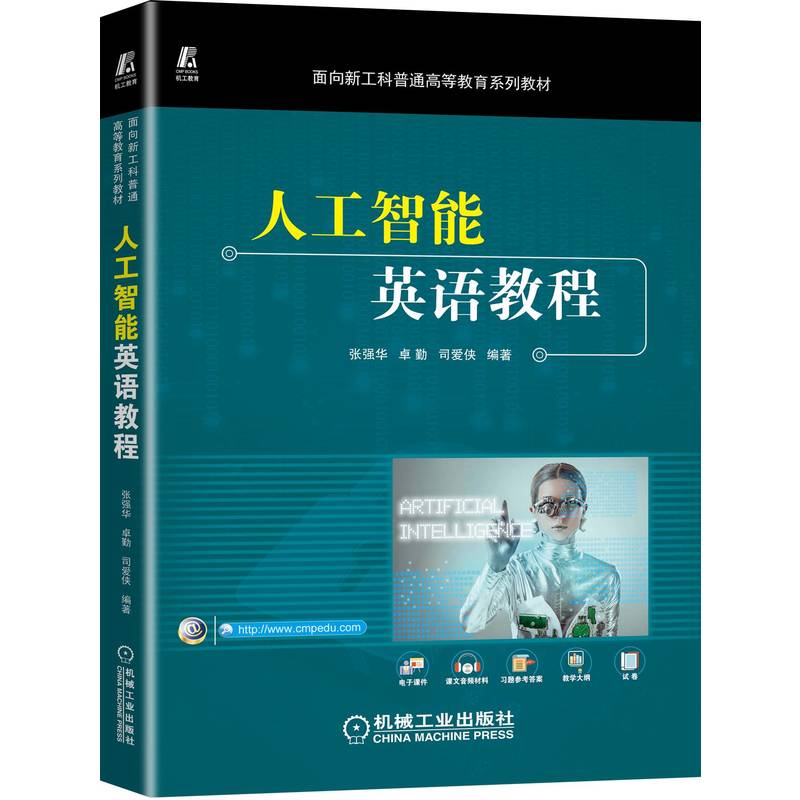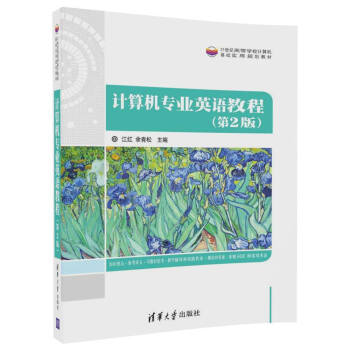- 电子工业出版社
- 9787121259951
- 1-1
- 114122
- 64217098-9
- 平塑单衬
- 16开
- 2015-05
- 454
- 284
- 应用电子技术
- 高职
作者简介
内容简介
本书涉及到电子器件、集成电路、基本放大电路、数字电路等课程的基本知识,旨在逐步提高学生的阅读、理解和翻译电子技术专业书刊资料的能力,为学生今后能够以英语为工具获取和交流专业技术信息打下良好的基础。本书注重选用各种不同类型的资料,有教材、说明书、广告、科普资料,并附有较多的插图,以达到比较好的教学效果,同时可以拓宽学生的知识面。适当介绍了翻译知识,教材配有适量的练习与扩展阅读,可供教师在教学中选用和学生自学。
目录
目 录
Unit 1 A Brief Introduction of Electronic Technology (1)
1.1 Text (1)
1.1.1 History about Electronics (1)
1.1.2 Introduce to Some Courses (2)
1.2 Reading Materials (4)
1.2.1 an Advertisement (4)
1.2.2 Do You Know These Electronic Systems? (4)
1.2.3 Domestic Power Plugs & Sockets (4)
1.2.4 More Courses (5)
1.3 Knowledge about Translation(翻译知识1――科技英语的特点) (7)
1.4 Exercises (8)
1.5 课文译文 (9)
1.5.1 电子技术历史 (9)
1.5.2 一些课程介绍 (10)
1.6 阅读材料参考译文 (11)
1.6.1 招生广告 (11)
1.6.2 你了解这些电子系统吗 (11)
1.6.3 民用电源插座和插头 (11)
1.6.4 更多课程介绍 (12)
Unit 2 Electrical Components (14)
2.1 Text (14)
2.1.1 Resistors (14)
2.1.2 Capacitors (15)
2.1.3 Inductors (16)
2.2 Reading Materials (18)
2.2.1 Nonlinear Resistors (18)
2.2.2 Transformers (19)
2.2.3 Various Low Voltage Apparatus (19)
2.3 Knowledge about Translation(翻译知识2――单词) (21)
2.4 Exercises (22)
2.5 课文译文 (23)
2.5.1 电阻器 (23)
2.5.2 电容器 (24)
2.5.3 电感器 (25)
2.6 阅读材料参考译文 (25)
2.6.1 非线性电阻器 (25)
2.6.2 变压器 (25)
2.6.3 各种低压电器设备 (26)
Unit 3 Instruments (28)
3.1 Text (28)
3.1.1 Multimeters (28)
3.1.2 the Oscilloscope (29)
3.2 Reading Materials (31)
3.2.1 How Does an Oscilloscope Work (31)
3.2.2 Analog and Digital Oscilloscope (32)
3.2.3 Wattmeter (32)
3.2.4 Signal Generator (33)
3.3 Knowledge about Translation(翻译知识3――非谓语动词V-ing) (34)
3.4 Exercises (35)
3.5 课文参考译文 (36)
3.5.1 万用表 (36)
3.5.2 示波器 (37)
3.6 阅读材料参考译文 (37)
3.6.1 示波器是如何工作的 (37)
3.6.2 模拟示波器和数字示波器 (38)
3.6.3 瓦特表 (38)
3.6.4 信号发生器 (39)
Unit 4 Electronic Components (40)
4.1 Text (40)
4.1.1 Semiconductor Diode (40)
4.1.2 NPN Bipolar Transistor (41)
4.1.3 MOS Transistors (42)
4.1.4 Ideal Operational Amplifier (43)
4.2 Reading Materials (44)
4.2.1 Audio Amplifiers (44)
4.2.2 the Transistor as a Switch (45)
4.3 Knowledge about Translation(翻译知识4――非谓语动词 to V) (47)
4.4 Exercises (48)
4.5 课文参考译文 (49)
4.5.1 半导体二极管 (49)
4.5.2 NPN 双极型晶体管 (50)
4.5.3 MOS晶体管 (50)
4.5.4 理想运算放大器 (51)
4.6 阅读材料参考译文 (51)
4.6.1 音频放大电路 (51)
4.6.2 三极管用做开关 (52)
Unit 5 Power Supplies (53)
5.1 Text (53)
5.1.1 Information on Power Supplies (53)
5.1.2 Bridge (Full-wave) Rectifier (53)
5.1.3 Filter (54)
5.1.4 Zener Diode (54)
5.1.5 Linear Voltage Regulator (55)
5.2 Reading Materials (56)
5.2.1 about the IEEE (Institute of Electrical and Electronics Engineers) (56)
5.2.2 Robots (56)
5.2.3 How Power Grids Work (57)
5.3 Knowledge about Translation(翻译知识5――非谓语动词V-ed) (60)
5.4 Exercises (61)
5.5 课文参考译文 (62)
5.5.1 关于(稳压)电源 (62)
5.5.2 桥式(全波)整流器 (63)
5.5.3 滤波器 (63)
5.5.4 齐纳二极管(稳压管) (63)
5.5.5 线性稳压器 (63)
5.6 阅读材料参考译文 (64)
5.6.1 关于IEEE(电气电子工程师学会) (64)
5.6.2 机器人 (64)
5.6.3 电力网是如何工作的 (65)
Unit 6 Linear Circuit Analysis (67)
6.1 Text (67)
6.1.1 Electric Circuit (67)
6.1.2 Ohm's Law (67)
6.1.3 Kirchhoff 's Law (68)
6.1.4 Circuit Analysis Techniques (69)
6.1.5 Sinusoidal Circuits (69)
6.2 Reading Materials (70)
6.2.1 Circuit Breaker (70)
6.2.2 Information on Amplitude Modulation (AM) (71)
6.2.3 Thévenin's Theorem (72)
6.2.4 Apple iPod Classic 120 GB Silver (73)
6.3 Knowledge about Translation(翻译知识6――It的用法) (73)
6.4 Exercises (75)
6.5 课文参考译文 (76)
6.5.1 电路 (76)
6.5.2 欧姆定律 (76)
6.5.3 基尔霍夫定律 (77)
6.5.4 电路分析方法 (77)
6.5.5 正弦电路 (78)
6.6 阅读材料参考译文 (78)
6.6.1 电路断路器 (78)
6.6.2 关于调幅 (79)
6.6.3 戴维南定理 (79)
6.6.4 苹果(公司)iPod classic 120 GB 银色 (79)
Unit 7 Integrated Circuit (81)
7.1 Text (81)
7.1.1 Information on Integrated Circuits (81)
7.1.2 Chip and Chip Holders (82)
7.1.3 Bipolar Integrated Circuits & MOS Integrated Circuits (83)
7.1.4 the Process of IC Design (83)
7.2 Reading Materials (84)
7.2.1 Circuit Board (84)
7.2.2 Circuit Delay (85)
7.2.3 3G Phones to Use Sony FeliCa IC Chip (85)
7.2.4 Electromagnetic Radiation and Lonosphere (86)
7.2.5 Garmin Nuvi 260 3.5-Inch Portable GPS Navigator (87)
7.3 Knowledge about Translation(翻译知识7――That 的用法) (88)
7.4 Exercises (89)
7.5 课文参考译文 (91)
7.5.1 关于集成电路 (91)
7.5.2 芯片和芯片插座 (91)
7.5.3 双极型(晶体管)集成电路和MOS集成电路 (92)
7.5.4 集成电路的设计过程 (92)
7.6 阅读材料参考译文 (92)
7.6.1 电路板 (92)
7.6.2 电路延迟 (93)
7.6.3 用索尼公司FeliCa芯片的3G手机 (93)
7.6.4 电磁辐射和电离层 (94)
7.6.5 Garmin Nuvi 260 3.5英寸便携式导航仪 (94)
Unit 8 Digital Logic Circuits (96)
8.1 Text (96)
8.1.1 Number Systems (96)
8.1.2 Logical Gates (96)
8.1.3 the Flip-flops (97)
8.2 Reading Materials (99)
8.2.1 74 Series Logic ICs (99)
8.2.2 Registers (100)
8.2.3 Counter (100)
8.2.4 7-segment Display Drivers (102)
8.3 Knowledge about Translation(翻译知识8――Which的用法) (102)
8.4 Exercises (104)
8.5 课文参考译文 (105)
8.5.1 数字系统 (105)
8.5.2 逻辑门 (105)
8.5.3 触发器 (106)
8.6 阅读材料参考译文 (107)
8.6.1 74系列集成逻辑电路 (107)
8.6.2 寄存器 (107)
8.6.3 计数器 (108)
8.6.4 7段显示驱动(芯片) (109)
Unit 9 Microcomputers (110)
9.1 Text (110)
9.1.1 Basic Computer (110)
9.1.2 the Motherboard (110)
9.1.3 the System Bus (111)
9.1.4 Main Memory (112)
9.1.5 BIOS (Basic Input/Output System) (112)
9.2 Reading Materials (114)
9.2.1 Microcontroller (114)
9.2.2 about DNA Computers (114)
9.2.3 PLC (115)
9.3 Knowledge about Translation(翻译知识9――连词Ⅰ) (116)
9.4 Exercises (117)
9.5 课文参考译文 (119)
9.5.1 基本型计算机 (119)
9.5.2 主板 (119)
9.5.3 系统总线 (119)
9.5.4 主存(内存) (120)
9.5.5 BIOS(基本输入/输出系统) (120)
9.6 阅读材料参考译文 (121)
9.6.1 单片机(微控制器) (121)
9.6.2 DNA 计算机 (121)
9.6.3 PLC(可编程逻辑控制器) (122)
Unit 10 Programming the Computer (123)
10.1 Text (123)
10.1.1 C as a Structured Language (123)
10.1.2 MATLAB Language (124)
10.1.3 Assembly Language Instructions (125)
10.1.4 Introduce to operating systems (126)
10.2 Reading Materials (128)
10.2.1 What Does Operating System Do (128)
10.2.2 Introduction of Microsoft Certification Program (MCP) (129)
10.2.3 Object-Oriented Programming (129)
10.3 Knowledge about Translation (翻译知识10――连词Ⅱ) (130)
10.4 Exercises (131)
10.5 课文参考译文 (133)
10.5.1 结构化语言C (133)
10.5.2 MATLAB语言 (133)
10.5.3 汇编语言指令 (134)
10.5.4 操作系统简介 (134)
10.6 阅读材料参考译文 (135)
10.6.1 操作系统做些什么 (135)
10.6.2 微软认证项目介绍 (136)
10.6.3 面向对象的编程 (136)
Unit 11 Television (137)
11.1 Text (137)
11.1.1 about Television (137)
11.1.2 Color TV (138)
11.1.3 Getting the Signal to TV (139)
11.2 Reading Materials (140)
11.2.1 Digital TV (140)
11.2.2 LCD (Liquid Crystal Display) (141)
11.2.3 Pure Vision Plasma Display (142)
11.3 Knowledge about Translation(翻译知识11――虚拟语气) (142)
11.4 Exercises (144)
11.5 课文参考译文 (145)
11.5.1 关于电视 (145)
11.5.2 彩色电视 (146)
11.5.3 电视机接收到的信号 (146)
11.6 阅读材料参考译文 (147)
11.6.1 数字电视 (147)
11.6.2 LCD(液晶显示器) (147)
11.6.3 纯平、等离子显示器 (148)
Unit 12 Digital Camera (149)
12.1 Text (149)
12.1.1 Principle (149)
12.1.2 Picture Quality (149)
12.1.3 Features (150)
12.1.4 Memory and Connectivity (151)
12.2 Reading Materials (153)
12.2.1 Digital Camcorders (153)
12.2.2 Video Compression (153)
12.2.3 X3 Technology (154)
12.3 Knowledge about Translation(翻译知识12――倒装) (155)
12.4 Exercises (156)
12.5 课文参考译文 (157)
12.5.1 原理 (157)
12.5.2 图像质量 (158)
12.5.3 特点 (158)
12.5.4 存储器和连接 (158)
12.6 阅读材料参考译文 (159)
12.6.1 数码摄像机 (159)
12.6.2 视频压缩 (159)
12.6.3 X3技术 (160)
Unit 13 Internet-based Communication (161)
13.1 Text (161)
13.1.1 Instant Messaging (161)
13.1.2 Internet Telephony & VoIP(Voice over Internet Protocol) (162)
13.1.3 E-mail (162)
13.1.4 Videoconference (163)
13.1.5 SMS & Wireless Communications (163)
13.2 Reading Materials (164)
13.2.1 Server (164)
13.2.2 about Web Page (165)
13.2.3 the Cell Approach (166)
13.2.4 Inside a Cell Phone (166)
13.2.5 Nokia N95 (167)
13.3 Knowledge about Translation(翻译知识13――否定形式) (168)
13.4 Exercises (169)
13.5 课文参考译文 (171)
13.5.1 即时消息(网上聊天) (171)
13.5.2 网上通话和网络电话 (171)
13.5.3 电子邮件 (172)
13.5.4 视频会议 (172)
13.5.5 短消息服务和线通信 (172)
13.6 阅读材料参考译文 (173)
13.6.1 服务器 (173)
13.6.2 网页 (173)
13.6.3 手机(蜂窝)技术 (174)
13.6.4 手机的内部 (174)
13.6.5 诺基亚N95 (175)
Unit 14 Electrical Appliances (176)
14.1 Text (176)
14.1.1 the Refrigerator (176)
14.1.2 the Air Conditioner (177)
14.1.3 the Microwave Oven (177)
14.2 Reading Materials (179)
14.2.1 Gas and Propane Refrigerators (179)
14.2.2 History about Microwave Oven (180)
14.2.3 Vacuum Cleaner (180)
14.2.4 Embedded System (182)
14.3 Knowledge about Translation(翻译知识14――分离现象) (182)
14.4 Exercises (183)
14.5 课文参考译文 (184)
14.5.1 冰箱 (184)
14.5.2 空调 (185)
14.5.3 微波炉 (185)
14.6 阅读材料译文 (186)
14.6.1 汽油和丙烷冰箱 (186)
14.6.2 微波炉的由来 (186)
14.6.3 真空吸尘器 (187)
14.6.4 嵌入式系统 (188)
Unit 15 I/O Devices (189)
15.1 Text (189)
15.1.1 Keyboards (189)
15.1.2 Mice (or Mouse) (190)
15.1.3 Inkjet Printers (191)
15.1.4 the Laser Printer (192)
15.2 Reading Materials (194)
15.2.1 Touchscreen (194)
15.2.2 Colour Lasers (195)
15.2.3 Electronic Circuit Simulation (196)
15.3 Knowledge about Translation(翻译知识15――省略和插入语) (197)
15.4 Exercises (199)
15.5 课文参考译文 (200)
15.5.1 键盘 (200)
15.5.2 鼠标 (201)
15.5.3 喷墨打印机 (202)
15.5.4 激光打印机 (202)
15.6 阅读材料参考译文 (203)
15.6.1 触摸屏 (203)
15.6.2 彩色激光打印机 (204)
15.6.3 电子电路仿真 (205)
Unit 16 Multimedia Technology (206)
16.1 Text (206)
16.1.1 What is Multimedia (206)
16.1.2 Multimedia Assets (206)
16.1.3 Multimedia Applications (207)
16.2 Reading Materials (209)
16.2.1 DVD (209)
16.2.2 News: Vivid Animations Help Students with Science (211)
16.2.3 about Graphics Cards (211)
16.2.4 DirectX (212)
16.3 Knowledge on Writing a Research Paper(科技论文写作知识) (213)
16.4 Exercises (215)
16.5 课文参考译文 (217)
16.5.1 什么是多媒体 (217)
16.5.2 多媒体资源 (217)
16.5.3 多媒体的应用 (218)
16.6 阅读材料参考译文 (219)
16.6.1 DVD (219)
16.6.2 新闻:学生通过生动的仿真(实验)学科学 (220)
16.6.3 关于图像卡(或译做视频卡) (220)
16.6.4 DirectX (221)
Unit 17 User's Manual (222)
17.1 Text (222)
17.1.1 Introduction to MiraScan (222)
17.1.2 Scanning Reflective Originals (222)
17.1.3 Understanding MiraScan Functions (223)
17.2 Reading Materials (226)
17.2.1 NE555 (226)
17.2.2 AD574A (227)
17.2.3 Cover letter (228)
17.2.4 Resume (230)
17.3 Knowledge on Writing User's Manual(用户说明书写作知识) (231)
17.4 Exercises (232)
17.5 课文参考译文 (233)
17.5.1 MiraScan介绍 (233)
17.5.2 扫描不透明的原件 (233)
17.5.3 MiraScan功能 (234)
17.6 阅读材料参考译文 (235)
17.6.1 NE555 (235)
17.6.2 AD574A (236)
17.6.3 求职信 (236)
17.6.4 简历 (237)
Appendix A Reference Answers (239)
Appendix B Technical Vocabulary Index (259)
Reference (270)
Unit 1 A Brief Introduction of Electronic Technology (1)
1.1 Text (1)
1.1.1 History about Electronics (1)
1.1.2 Introduce to Some Courses (2)
1.2 Reading Materials (4)
1.2.1 an Advertisement (4)
1.2.2 Do You Know These Electronic Systems? (4)
1.2.3 Domestic Power Plugs & Sockets (4)
1.2.4 More Courses (5)
1.3 Knowledge about Translation(翻译知识1――科技英语的特点) (7)
1.4 Exercises (8)
1.5 课文译文 (9)
1.5.1 电子技术历史 (9)
1.5.2 一些课程介绍 (10)
1.6 阅读材料参考译文 (11)
1.6.1 招生广告 (11)
1.6.2 你了解这些电子系统吗 (11)
1.6.3 民用电源插座和插头 (11)
1.6.4 更多课程介绍 (12)
Unit 2 Electrical Components (14)
2.1 Text (14)
2.1.1 Resistors (14)
2.1.2 Capacitors (15)
2.1.3 Inductors (16)
2.2 Reading Materials (18)
2.2.1 Nonlinear Resistors (18)
2.2.2 Transformers (19)
2.2.3 Various Low Voltage Apparatus (19)
2.3 Knowledge about Translation(翻译知识2――单词) (21)
2.4 Exercises (22)
2.5 课文译文 (23)
2.5.1 电阻器 (23)
2.5.2 电容器 (24)
2.5.3 电感器 (25)
2.6 阅读材料参考译文 (25)
2.6.1 非线性电阻器 (25)
2.6.2 变压器 (25)
2.6.3 各种低压电器设备 (26)
Unit 3 Instruments (28)
3.1 Text (28)
3.1.1 Multimeters (28)
3.1.2 the Oscilloscope (29)
3.2 Reading Materials (31)
3.2.1 How Does an Oscilloscope Work (31)
3.2.2 Analog and Digital Oscilloscope (32)
3.2.3 Wattmeter (32)
3.2.4 Signal Generator (33)
3.3 Knowledge about Translation(翻译知识3――非谓语动词V-ing) (34)
3.4 Exercises (35)
3.5 课文参考译文 (36)
3.5.1 万用表 (36)
3.5.2 示波器 (37)
3.6 阅读材料参考译文 (37)
3.6.1 示波器是如何工作的 (37)
3.6.2 模拟示波器和数字示波器 (38)
3.6.3 瓦特表 (38)
3.6.4 信号发生器 (39)
Unit 4 Electronic Components (40)
4.1 Text (40)
4.1.1 Semiconductor Diode (40)
4.1.2 NPN Bipolar Transistor (41)
4.1.3 MOS Transistors (42)
4.1.4 Ideal Operational Amplifier (43)
4.2 Reading Materials (44)
4.2.1 Audio Amplifiers (44)
4.2.2 the Transistor as a Switch (45)
4.3 Knowledge about Translation(翻译知识4――非谓语动词 to V) (47)
4.4 Exercises (48)
4.5 课文参考译文 (49)
4.5.1 半导体二极管 (49)
4.5.2 NPN 双极型晶体管 (50)
4.5.3 MOS晶体管 (50)
4.5.4 理想运算放大器 (51)
4.6 阅读材料参考译文 (51)
4.6.1 音频放大电路 (51)
4.6.2 三极管用做开关 (52)
Unit 5 Power Supplies (53)
5.1 Text (53)
5.1.1 Information on Power Supplies (53)
5.1.2 Bridge (Full-wave) Rectifier (53)
5.1.3 Filter (54)
5.1.4 Zener Diode (54)
5.1.5 Linear Voltage Regulator (55)
5.2 Reading Materials (56)
5.2.1 about the IEEE (Institute of Electrical and Electronics Engineers) (56)
5.2.2 Robots (56)
5.2.3 How Power Grids Work (57)
5.3 Knowledge about Translation(翻译知识5――非谓语动词V-ed) (60)
5.4 Exercises (61)
5.5 课文参考译文 (62)
5.5.1 关于(稳压)电源 (62)
5.5.2 桥式(全波)整流器 (63)
5.5.3 滤波器 (63)
5.5.4 齐纳二极管(稳压管) (63)
5.5.5 线性稳压器 (63)
5.6 阅读材料参考译文 (64)
5.6.1 关于IEEE(电气电子工程师学会) (64)
5.6.2 机器人 (64)
5.6.3 电力网是如何工作的 (65)
Unit 6 Linear Circuit Analysis (67)
6.1 Text (67)
6.1.1 Electric Circuit (67)
6.1.2 Ohm's Law (67)
6.1.3 Kirchhoff 's Law (68)
6.1.4 Circuit Analysis Techniques (69)
6.1.5 Sinusoidal Circuits (69)
6.2 Reading Materials (70)
6.2.1 Circuit Breaker (70)
6.2.2 Information on Amplitude Modulation (AM) (71)
6.2.3 Thévenin's Theorem (72)
6.2.4 Apple iPod Classic 120 GB Silver (73)
6.3 Knowledge about Translation(翻译知识6――It的用法) (73)
6.4 Exercises (75)
6.5 课文参考译文 (76)
6.5.1 电路 (76)
6.5.2 欧姆定律 (76)
6.5.3 基尔霍夫定律 (77)
6.5.4 电路分析方法 (77)
6.5.5 正弦电路 (78)
6.6 阅读材料参考译文 (78)
6.6.1 电路断路器 (78)
6.6.2 关于调幅 (79)
6.6.3 戴维南定理 (79)
6.6.4 苹果(公司)iPod classic 120 GB 银色 (79)
Unit 7 Integrated Circuit (81)
7.1 Text (81)
7.1.1 Information on Integrated Circuits (81)
7.1.2 Chip and Chip Holders (82)
7.1.3 Bipolar Integrated Circuits & MOS Integrated Circuits (83)
7.1.4 the Process of IC Design (83)
7.2 Reading Materials (84)
7.2.1 Circuit Board (84)
7.2.2 Circuit Delay (85)
7.2.3 3G Phones to Use Sony FeliCa IC Chip (85)
7.2.4 Electromagnetic Radiation and Lonosphere (86)
7.2.5 Garmin Nuvi 260 3.5-Inch Portable GPS Navigator (87)
7.3 Knowledge about Translation(翻译知识7――That 的用法) (88)
7.4 Exercises (89)
7.5 课文参考译文 (91)
7.5.1 关于集成电路 (91)
7.5.2 芯片和芯片插座 (91)
7.5.3 双极型(晶体管)集成电路和MOS集成电路 (92)
7.5.4 集成电路的设计过程 (92)
7.6 阅读材料参考译文 (92)
7.6.1 电路板 (92)
7.6.2 电路延迟 (93)
7.6.3 用索尼公司FeliCa芯片的3G手机 (93)
7.6.4 电磁辐射和电离层 (94)
7.6.5 Garmin Nuvi 260 3.5英寸便携式导航仪 (94)
Unit 8 Digital Logic Circuits (96)
8.1 Text (96)
8.1.1 Number Systems (96)
8.1.2 Logical Gates (96)
8.1.3 the Flip-flops (97)
8.2 Reading Materials (99)
8.2.1 74 Series Logic ICs (99)
8.2.2 Registers (100)
8.2.3 Counter (100)
8.2.4 7-segment Display Drivers (102)
8.3 Knowledge about Translation(翻译知识8――Which的用法) (102)
8.4 Exercises (104)
8.5 课文参考译文 (105)
8.5.1 数字系统 (105)
8.5.2 逻辑门 (105)
8.5.3 触发器 (106)
8.6 阅读材料参考译文 (107)
8.6.1 74系列集成逻辑电路 (107)
8.6.2 寄存器 (107)
8.6.3 计数器 (108)
8.6.4 7段显示驱动(芯片) (109)
Unit 9 Microcomputers (110)
9.1 Text (110)
9.1.1 Basic Computer (110)
9.1.2 the Motherboard (110)
9.1.3 the System Bus (111)
9.1.4 Main Memory (112)
9.1.5 BIOS (Basic Input/Output System) (112)
9.2 Reading Materials (114)
9.2.1 Microcontroller (114)
9.2.2 about DNA Computers (114)
9.2.3 PLC (115)
9.3 Knowledge about Translation(翻译知识9――连词Ⅰ) (116)
9.4 Exercises (117)
9.5 课文参考译文 (119)
9.5.1 基本型计算机 (119)
9.5.2 主板 (119)
9.5.3 系统总线 (119)
9.5.4 主存(内存) (120)
9.5.5 BIOS(基本输入/输出系统) (120)
9.6 阅读材料参考译文 (121)
9.6.1 单片机(微控制器) (121)
9.6.2 DNA 计算机 (121)
9.6.3 PLC(可编程逻辑控制器) (122)
Unit 10 Programming the Computer (123)
10.1 Text (123)
10.1.1 C as a Structured Language (123)
10.1.2 MATLAB Language (124)
10.1.3 Assembly Language Instructions (125)
10.1.4 Introduce to operating systems (126)
10.2 Reading Materials (128)
10.2.1 What Does Operating System Do (128)
10.2.2 Introduction of Microsoft Certification Program (MCP) (129)
10.2.3 Object-Oriented Programming (129)
10.3 Knowledge about Translation (翻译知识10――连词Ⅱ) (130)
10.4 Exercises (131)
10.5 课文参考译文 (133)
10.5.1 结构化语言C (133)
10.5.2 MATLAB语言 (133)
10.5.3 汇编语言指令 (134)
10.5.4 操作系统简介 (134)
10.6 阅读材料参考译文 (135)
10.6.1 操作系统做些什么 (135)
10.6.2 微软认证项目介绍 (136)
10.6.3 面向对象的编程 (136)
Unit 11 Television (137)
11.1 Text (137)
11.1.1 about Television (137)
11.1.2 Color TV (138)
11.1.3 Getting the Signal to TV (139)
11.2 Reading Materials (140)
11.2.1 Digital TV (140)
11.2.2 LCD (Liquid Crystal Display) (141)
11.2.3 Pure Vision Plasma Display (142)
11.3 Knowledge about Translation(翻译知识11――虚拟语气) (142)
11.4 Exercises (144)
11.5 课文参考译文 (145)
11.5.1 关于电视 (145)
11.5.2 彩色电视 (146)
11.5.3 电视机接收到的信号 (146)
11.6 阅读材料参考译文 (147)
11.6.1 数字电视 (147)
11.6.2 LCD(液晶显示器) (147)
11.6.3 纯平、等离子显示器 (148)
Unit 12 Digital Camera (149)
12.1 Text (149)
12.1.1 Principle (149)
12.1.2 Picture Quality (149)
12.1.3 Features (150)
12.1.4 Memory and Connectivity (151)
12.2 Reading Materials (153)
12.2.1 Digital Camcorders (153)
12.2.2 Video Compression (153)
12.2.3 X3 Technology (154)
12.3 Knowledge about Translation(翻译知识12――倒装) (155)
12.4 Exercises (156)
12.5 课文参考译文 (157)
12.5.1 原理 (157)
12.5.2 图像质量 (158)
12.5.3 特点 (158)
12.5.4 存储器和连接 (158)
12.6 阅读材料参考译文 (159)
12.6.1 数码摄像机 (159)
12.6.2 视频压缩 (159)
12.6.3 X3技术 (160)
Unit 13 Internet-based Communication (161)
13.1 Text (161)
13.1.1 Instant Messaging (161)
13.1.2 Internet Telephony & VoIP(Voice over Internet Protocol) (162)
13.1.3 E-mail (162)
13.1.4 Videoconference (163)
13.1.5 SMS & Wireless Communications (163)
13.2 Reading Materials (164)
13.2.1 Server (164)
13.2.2 about Web Page (165)
13.2.3 the Cell Approach (166)
13.2.4 Inside a Cell Phone (166)
13.2.5 Nokia N95 (167)
13.3 Knowledge about Translation(翻译知识13――否定形式) (168)
13.4 Exercises (169)
13.5 课文参考译文 (171)
13.5.1 即时消息(网上聊天) (171)
13.5.2 网上通话和网络电话 (171)
13.5.3 电子邮件 (172)
13.5.4 视频会议 (172)
13.5.5 短消息服务和线通信 (172)
13.6 阅读材料参考译文 (173)
13.6.1 服务器 (173)
13.6.2 网页 (173)
13.6.3 手机(蜂窝)技术 (174)
13.6.4 手机的内部 (174)
13.6.5 诺基亚N95 (175)
Unit 14 Electrical Appliances (176)
14.1 Text (176)
14.1.1 the Refrigerator (176)
14.1.2 the Air Conditioner (177)
14.1.3 the Microwave Oven (177)
14.2 Reading Materials (179)
14.2.1 Gas and Propane Refrigerators (179)
14.2.2 History about Microwave Oven (180)
14.2.3 Vacuum Cleaner (180)
14.2.4 Embedded System (182)
14.3 Knowledge about Translation(翻译知识14――分离现象) (182)
14.4 Exercises (183)
14.5 课文参考译文 (184)
14.5.1 冰箱 (184)
14.5.2 空调 (185)
14.5.3 微波炉 (185)
14.6 阅读材料译文 (186)
14.6.1 汽油和丙烷冰箱 (186)
14.6.2 微波炉的由来 (186)
14.6.3 真空吸尘器 (187)
14.6.4 嵌入式系统 (188)
Unit 15 I/O Devices (189)
15.1 Text (189)
15.1.1 Keyboards (189)
15.1.2 Mice (or Mouse) (190)
15.1.3 Inkjet Printers (191)
15.1.4 the Laser Printer (192)
15.2 Reading Materials (194)
15.2.1 Touchscreen (194)
15.2.2 Colour Lasers (195)
15.2.3 Electronic Circuit Simulation (196)
15.3 Knowledge about Translation(翻译知识15――省略和插入语) (197)
15.4 Exercises (199)
15.5 课文参考译文 (200)
15.5.1 键盘 (200)
15.5.2 鼠标 (201)
15.5.3 喷墨打印机 (202)
15.5.4 激光打印机 (202)
15.6 阅读材料参考译文 (203)
15.6.1 触摸屏 (203)
15.6.2 彩色激光打印机 (204)
15.6.3 电子电路仿真 (205)
Unit 16 Multimedia Technology (206)
16.1 Text (206)
16.1.1 What is Multimedia (206)
16.1.2 Multimedia Assets (206)
16.1.3 Multimedia Applications (207)
16.2 Reading Materials (209)
16.2.1 DVD (209)
16.2.2 News: Vivid Animations Help Students with Science (211)
16.2.3 about Graphics Cards (211)
16.2.4 DirectX (212)
16.3 Knowledge on Writing a Research Paper(科技论文写作知识) (213)
16.4 Exercises (215)
16.5 课文参考译文 (217)
16.5.1 什么是多媒体 (217)
16.5.2 多媒体资源 (217)
16.5.3 多媒体的应用 (218)
16.6 阅读材料参考译文 (219)
16.6.1 DVD (219)
16.6.2 新闻:学生通过生动的仿真(实验)学科学 (220)
16.6.3 关于图像卡(或译做视频卡) (220)
16.6.4 DirectX (221)
Unit 17 User's Manual (222)
17.1 Text (222)
17.1.1 Introduction to MiraScan (222)
17.1.2 Scanning Reflective Originals (222)
17.1.3 Understanding MiraScan Functions (223)
17.2 Reading Materials (226)
17.2.1 NE555 (226)
17.2.2 AD574A (227)
17.2.3 Cover letter (228)
17.2.4 Resume (230)
17.3 Knowledge on Writing User's Manual(用户说明书写作知识) (231)
17.4 Exercises (232)
17.5 课文参考译文 (233)
17.5.1 MiraScan介绍 (233)
17.5.2 扫描不透明的原件 (233)
17.5.3 MiraScan功能 (234)
17.6 阅读材料参考译文 (235)
17.6.1 NE555 (235)
17.6.2 AD574A (236)
17.6.3 求职信 (236)
17.6.4 简历 (237)
Appendix A Reference Answers (239)
Appendix B Technical Vocabulary Index (259)
Reference (270)

